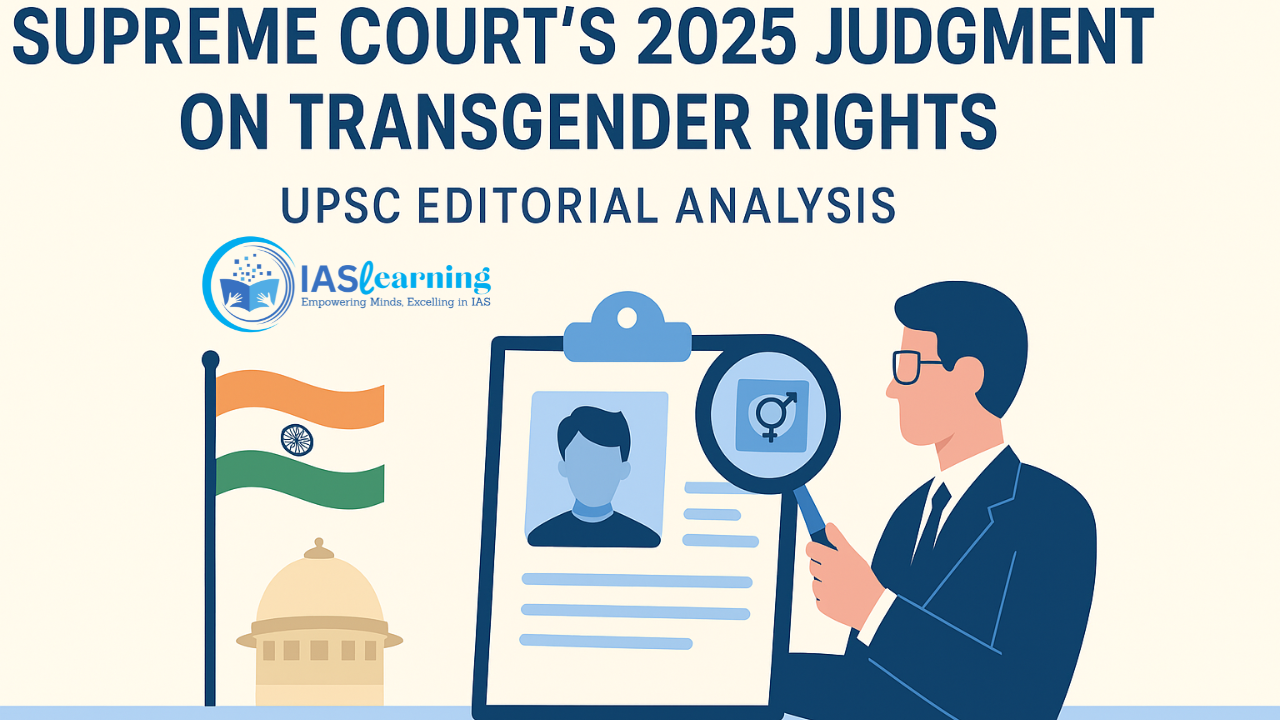GS Paper 2 – Welfare of Vulnerable Sections | Social Justice | Governance
The Supreme Court’s landmark judgment in Jane Kaushik vs Union of India (2025) has reopened a crucial discussion on the implementation gap in transgender rights. Despite the progressive NALSA 2014 judgment and the Transgender Persons (Protection of Rights) Act, 2019, the Court highlighted that most States and the Centre have failed to enforce real protections for transgender persons.
🔎 Background: NALSA Judgment (2014) – A Turning Point

The NALSA vs Union of India (2014) judgment:
- Recognised transgender persons as the “third gender”
- Affirmed their rights under Articles 14, 15, 16 & 21
- Upheld self-identification of gender without medical proof
- Directed governments to:
- Provide reservations in education & jobs
- Treat them as Socially & Educationally Backward Class
- Ensure inclusion in healthcare, education & public spaces
- Conduct sensitisation and awareness programmes
This was globally celebrated as India’s gender justice milestone.
🏛️ Legislative Follow-Up: Transgender Persons Act, 2019
The Act aimed to implement NALSA, with key provisions:
✅ Positives
- Prohibits discrimination in education, jobs, healthcare & public services
- Set up the National Council for Transgender Persons
- Mandated welfare measures and social inclusion
⚠️ Key Criticisms
- Certificate from District Magistrate dilutes self-ID principle
- No clear reservation roadmap, despite NALSA
- Weak enforcement – no penalties for violations
- Limited focus on employment & healthcare access
Result: The Act remained largely symbolic, with weak implementation.
⚖️ Why the Supreme Court Intervened Again (2025)
The Court emphasised:
- Need for substantive equality, not just formal legal recognition
- State inaction = violation of fundamental rights under Article 21
- Accountability must shift from “laws passed” to “impact delivered”
- Reform must be institutional, time-bound and measurable
📜 Key Directions Issued by the Supreme Court (2025)
🧩 Advisory Committee Formation
Headed by Justice (Retd.) Asha Menon to:
- Review implementation of 2019 Act & Rules
- Suggest equal opportunity policy for transgender persons
⏳ Time-Bound Compliance
- Policies must be notified within 3 months of the Committee report
🏫 Guidelines to Public Institutions
- Schools, colleges & hospitals must ensure:
- Gender-sensitive policies
- Inclusive infrastructure
- Grievance redressal mechanisms
🚨 Recognition of Inaction as Violation
Courts now treat neglect and delay as a direct rights violation.
🚧 Current Challenges & Exclusion Dimensions
🏢 Administrative Apathy
- Many States still lack transgender welfare boards
- Minimal budget allocation
- No reliable data, progress audits or monitoring
👥 Social & Institutional Barriers
- Bullying in schools → high dropout rates
- Job market exclusion → dependence on begging / sex work
- Healthcare insensitivity & lack of gender-affirming care
- Difficulty in obtaining IDs → exclusion from welfare schemes
🔁 Multi-Dimensional Vulnerabilities
| Sector | Issue Faced |
|---|---|
| Education | Bullying, exclusion, no safe learning environment |
| Employment | No reservations, workplace bias |
| Health | No hormonal therapy support, poor mental health care |
| Social Security | Barrier to ID documents, bank access |
🚀 Way Forward: From Recognition to Real Inclusion
🏛️ Institutional Reforms
- Activate Welfare Boards + grievance redressal in all States
- Annual impact audits of schemes
- Gender desks in schools & hospitals
🎓 Affirmative Action
- Implement reservations as directed by NALSA
- Skill training + entrepreneurship + access to micro-credit
- Coverage under:
- PM-JAY
- Jan Dhan
- PM-Awas Yojana
Read More: India to Host Commonwealth Games 2030
🧑⚖️ Legal & Administrative Steps
- Amend 2019 Act → Restore full self-ID
- Penal provisions for discrimination
- Uniform workplace guidelines for inclusion
🧠 Awareness & Social Change
- Mandatory training for teachers, police, govt officials
- Curriculum reforms to teach gender diversity
- Positive media representation
🧵 Conclusion
Legal rights alone cannot guarantee equality.
India must shift from recognition to real empowerment — ensuring dignity, security and equal opportunity for transgender persons.
A truly inclusive democracy is one where every gender identity thrives with respect and rights.
📝 UPSC Mains Practice Question
“Legal recognition of transgender persons is necessary but not sufficient for achieving equality.” Discuss in light of recent judicial interventions. (250 words)
Read More: Telecommunications (Telecom Cyber Security) Amendment Rules, 2025
